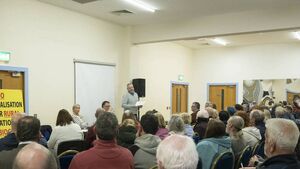'We’re not going to go down without a fight.'

The Ballyvass Biogas Concern Group Photo: Aisling Hyland
CONCERNS about HGV traffic and pollution were expressed about a proposed biomethane plant in south Kildare last week.
The packed meeting in the Castledermot Community Centre last Thursday heard that 30 HGVS would be travelling to and from the plant in Ballyvass, if the developer CycleØ completed the project.
Organized by the Ballyvass Biogas Concern Group, information about the project was shared while a determined meeting chairperson John Phelan said: “We’re not going to go down without a fight.”
There was some frustration that no public representative attended the meeting although several had sent their apologies and promised their support.
Mr Phelan said the group had drafted to send to CycleØ, which members of the community were encouraged to sign in support.
Ballyvass group member, Paddy Byrne, had been engaging with CycleØ directly to get as much as information as possible and how it will affect people.
Paddy explained that the proposed facility is set to take in 74,000 tonnes of material each year, with a further 70,000 tonnes of waste material which will need to be moved offsite.
This means that 30 HGVs will travel to and from the site each day, using the Ballyvass road and roads in the surrounding area, resulting in 60 traffic movements daily.
Mr Byrne added that planning permission has already been granted for a quarry near the proposed biogas site which will have 17 HGVs serving it.
Overall, this could mean 94 movements of lorries in the area daily, possibly from early in the morning to late in the evening.
“These are the simple facts of what this is going to do,” he said. “94 movements of traffic will affect everyone.”
He said: “I didn’t make up the traffic movements, they told me that.” CycleØ were contacted for comment about this point but did not respond at the time of the going to print.
Mr Byrne said that biogas companies are popping up all over the country in the interest of grants.
“It’s a race to the money pot,” he said.
The group believe it’s important to submit a letter to CycleØ to identify their worries, and everything they have discussed and to tell them that “we are a community and we do have an issue with this".
“I think we need to be strong,” he concluded.
When the meeting was open to the floor, attendees asked questions around protected waterways, for information on where HGVs might be travelling around in the area, and questions around the adjacent quarry and its impact.
There was dismay that no political representative was at the meeting.
Deputy Mark Wall had contacted and apologised for not being able to attend, but promised to help out and offer support with the situation.
The meeting heard both Deputy Seán Ó Fearghaíl and Athy councillor Brian Dooley also did not attend, but have agreed to put in objections against the proposed project.
One woman from the crowd referenced a previous meeting and called it “absolute bullsh*t” that TDs and cllrs did not stay for its full duration.
A man said in agreement: “Some are local residents and they’re not even here!”
Two guest speakers attended travelling from from communities in Mayo and Tipperary who are facing similar facilities.
Chairperson of Swinford Biogas Concern Group in Mayo Moira Philbin, travelled from Swinford, Mayo to speak about her group’s own experience and success story in a very similar situation.
She alerted people to stay vigilant during the upcoming fight against the project, and said: “They’ll sell their mothers to get it (planning permission) through.”
She informed those in attendance about the potential risks the proposed development could bring, from stories gathered from areas around Ireland and the UK where biomethane plants had been put in.
Moira shared a story she was told when she visited the biogas site at Ballyboffey in Donegal some time ago.
A funeral brought many people to the town but they complained of the terrible smell coming from the biogas plant.
A smell so terrible that two people fainted because of it.
Aside from bad smells, Moira warned attendees against potential health risks such as explosions.
She told a story coming from Oxford, where a biomethane digester “blew up.” Also speaking on the night was Pat Shanahan from Killough Biogas Concern Group in Tippearary who advised members of possible risks associated with biogas plants including fire risks, air pollution, increased traffic, odor and nuisance, lack of regulation and monitoring, community division, house price impact, among others.
It is planned to hold another public meeting in a month’s time.
Group members will also be willing to give their time to help people draft their objections, should they need it.
.





